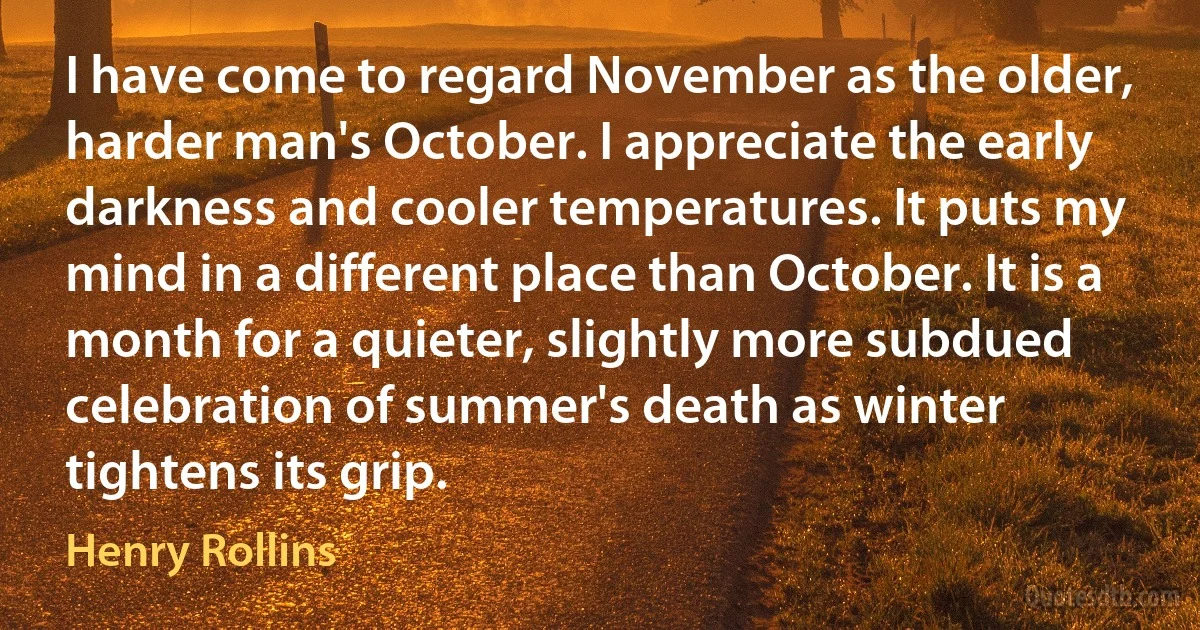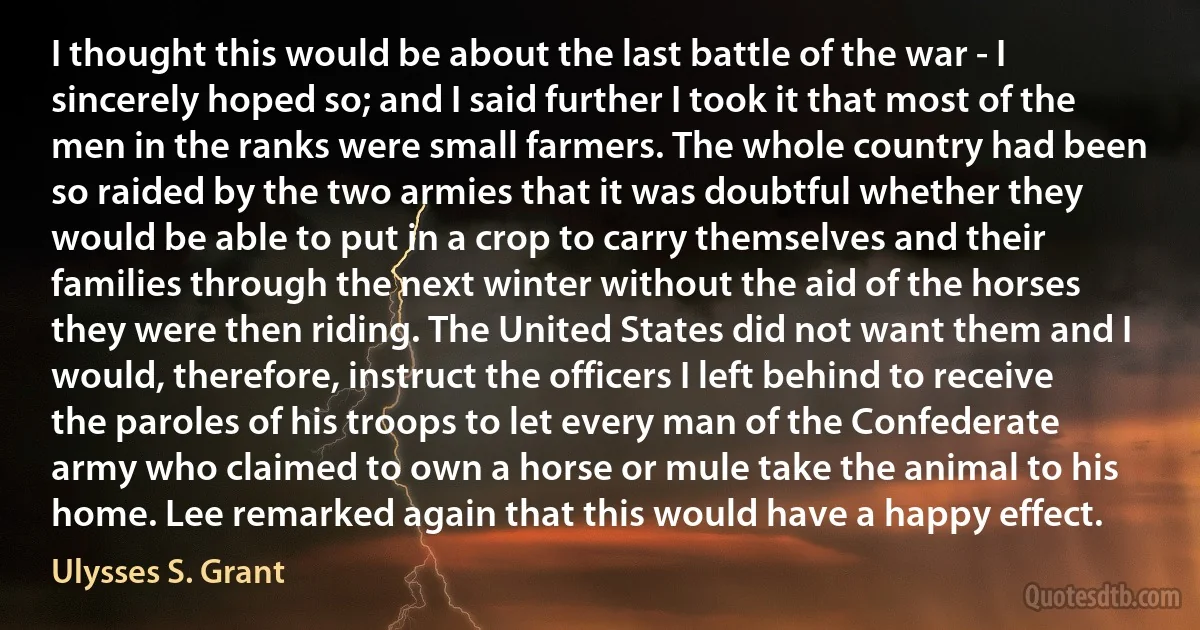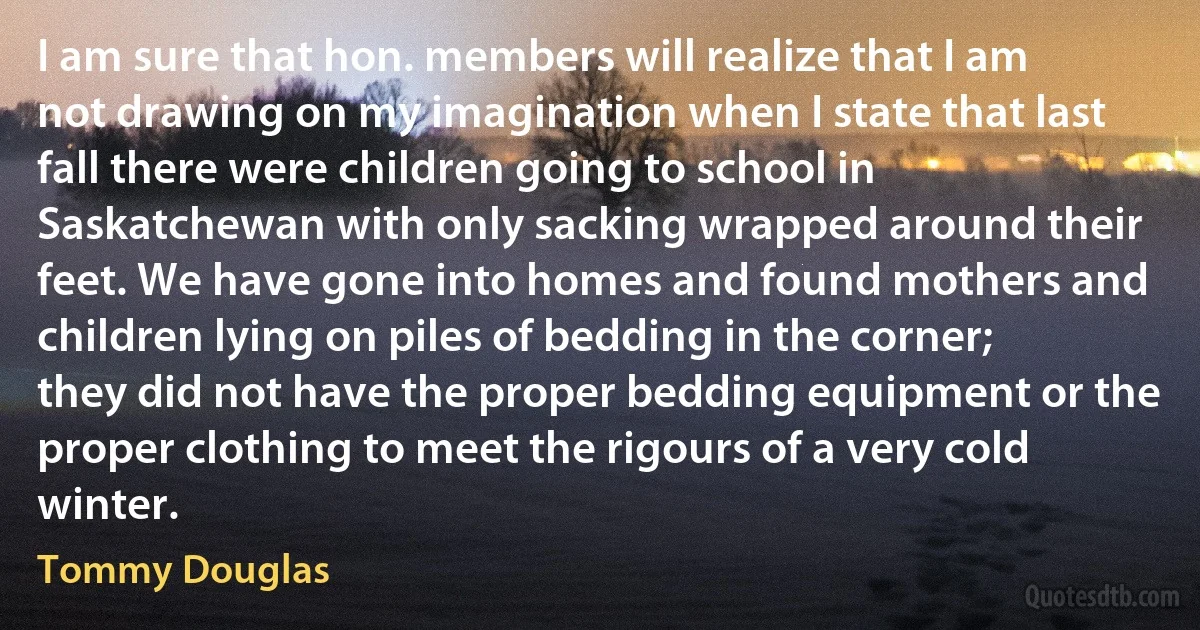Winter Quotes - page 13
I remember in the winter of 1945–46 cycling by myself along an open road near Muttra, when a young Brahmin drew alongside me and after some conversation in Urdu between us, pointed to his home some hundred yards from the road and suggested I go there with him for a drink of water. While my hosts used a brass vessel, I drank from a rough earthen tumbler, which, on thanking them and taking my leave, I smashed on the ground to show that I knew it could not anyhow be used again. 'He is a Hindu,' they said to one another with a smile. There is a sense in which it had been true: the British were married to India, as Venice was married to the sea.

Enoch Powell
The Christian Bible is a symbolic book, not a literal one. The one Christians know as Jesus was actually a symbol for the sun. Ancient sun worshippers believed the sun died at the end of the winter solstice and then three days later it would be reborn at the start of its cycle - December 25.

David Icke
If 22 bushels (1,300 pounds) of rice and 22 bushels of winter grain are harvested from a quarter acre field such as one of these, then the field will support five to ten people each investing an average of less than one hour of labor per day. But if the field were turned over to pasturage, or if the grain were fed to cattle, only one person could be supported per quarter acre. Meat becomes a luxury food when its production requires land which could provide food directly for human consumption. This has been shown clearly and definitely. Each person should ponder seriously how much hardship he is causing by indulging in food so expensively produced.

Masanobu Fukuoka
Being a beggar, he said, was not his fault, and he refused either to have any compunction about it or to let it trouble him. He was the enemy of society, and quite ready to take to crime if he saw a good opportunity. He refused on principle to be thrifty. In the summer he saved nothing, spending his surplus earnings on drink, as he did not care about women. If he was penniless when winter came on, then society must look after him. He was ready to extract every penny he could from charity, provided that he was not expected to say thank you for it. He avoided religious charities, however, for he said it stuck in his throat to sing hymns for buns. He had various other points of honour; for instance, it was his boast that never in his life, even when starving, had he picked up a cigarette end. He considered himself in a class above the ordinary run of beggars, who, he said, were an abject lot, without even the decency to be ungrateful.

George Orwell
He was keeping track of time. It was nearly two hours since he had last looked at his watch, but he knew what time it was to within about twenty seconds. It was an old skill, born of many long wakeful nights on active service. When you're waiting for something to happen, you close your body down like a beach house in winter and you let your mind lock onto the steady pace of the passing seconds. It's like suspended animation. It saves energy and it lifts the responsibility for your heartbeat away from your unconscious brain and passes it on to some kind of a hidden clock. Makes a huge black space for thinking in. But it keeps you just awake enough to be reach for whatever you need to be ready for. And it means you always know what time it is.

Lee Child
They fell upon an ungenial climate, where there were nine months of winter and three months of cold weather, and that called out the best energies of the men, and of the women too, to get a mere subsistence out of the soil, with such a climate. In their efforts to do that they cultivated industry and frugality at the same time - which is the real foundation of the greatness of the Pilgrims.

Ulysses S. Grant
It's a Rocket-raising: a festival new to this country. Soon it will come to the folk-attention how close Wernher von Braun's birthday is to the Spring Equinox, and the same German impulse that once rolled flower-boats through the towns and staged mock battles between young Spring and deathwhite old Winter will be erecting strange floral towers out in the clearings and meadows, and the young scientist-surrogate will be going round and round with Gravity or some such buffoon, and the children will be tickled, and laugh....

Thomas Pynchon
Our tasks are definite. The first to see that no man, woman, or child shall go hungry or unsheltered through the approaching winter.
The second is to see that our great benevolent agencies for character building, for hospitalization, for care of children and all their vast number of agencies of voluntary solicitude for the less fortunate are maintained in full strength.
The third is to maintain the bedrock principle of our liberties by the full mobilization of individual and local resources and responsibilities.
The fourth is that we may maintain the spiritual impulses in our people for generous giving and generous service-in the spirit that each is his brother's keeper.

Herbert Hoover
If I first see a tree in the winter, I might assume that it is not a fruit-tree. But when I return in the summer to find it covered with plums, I must exclaim, 'Excuse me! You were a fruit-tree after all.' Imagine, then, that a billion years ago some beings from another part of the galaxy made a tour through the solar system in their flying saucer and found no life. They would dismiss it as 'Just a bunch of old rocks!' But if they returned today, they would have to apologize: 'Well - you were peopling rocks after all!'
You may, of course, argue that there is no analogy between the two situations. The fruit-tree was at one time a seed inside a plum, but the earth - much less the solar system or the galaxy - was never a seed inside a person. But, oddly enough, you would be wrong.

Alan Watts
There was never a time when the world began, because it goes round and round like a circle, and there is no place on a circle where it begins. Look at my watch, which tells the time; it goes round, and so the world repeats itself again and again. But just as the hour-hand of the watch goes up to twelve and down to six, so, too, there is day and night, waking and sleeping, living and dying, summer and winter. You can't have any one of these without the other, because you wouldn't be able to know what black is unless you had seen it side-by-side with white, or white unless side-by-side with black.

Alan Watts
A snowball is simple, direct and familiar to most of us. I use this simplicity as a container for feelings and ideas that function on many levels. Occasionally I have come across a last patch of snow on top of a mountain in late May or June. There's something very powerful about finding snow in summer. It's as if the whole of winter has drained through that white hole - a concentration of winter.

Andy Goldsworthy
My present opinion favors the following disposition of the troops for winter-quarters. The garrison here should consist of Patterson's, Learned's, Clinton's, and the North Carolina brigades, which, I believe, will forma force sufficient for the purpose. If the horse is posted in Connecticut, as seems to be thought on, I think the troops coming from Rhode Island, in con junction with the horse, will form a sufficient covering party for the exposed parts of Connecticut and Westchester. I would only wish Clinton's brigade to be here, because it may interest the inhabitants to furnish supplies in the winter, and to encourage the militia to turn out with spirit, should the enemy make a sudden move towards the post. The connection between the army and country will have an influence in both these respects.

Nathanael Greene
As the enemy have the advantage of a water transportation, and the spring is the most difficult part of the year for a land conveyance, it is most probable, if they have any designs upon this post, they will commence their operations before the grass season. Will it not be worth while, therefore, to form a small magazine of provision and forage, at or near Mr. Erskine's Iron Works, for the purpose of subsisting the army on their march to this place? And another considerable magazine of provision and forage at Chester or Warwick for the support of this army in whatever position it may take for the relief of this garrison? These magazines should be formed from the westward, in the winter season, when there is the least call for transportation, and the roads the most favorable for the purpose.

Nathanael Greene
The treasury appears to be hard pressed on every side; and the demands of this time are infinitely greater than it is in their power to satisfy with the greatest exertions, upon the present plan of striking money. The truth of the affair is, there has been a great degree of negligence and want of timely attention, to prepare seasonably for the present demands. When I was in town in the winter, I reported to the Treasury Board what I thought would be absolutely necessary for the Quarter-master's department to the 2d of March; not one half of which have we been able to get, although every thing has been urged to induce them to supply our wants.

Nathanael Greene



